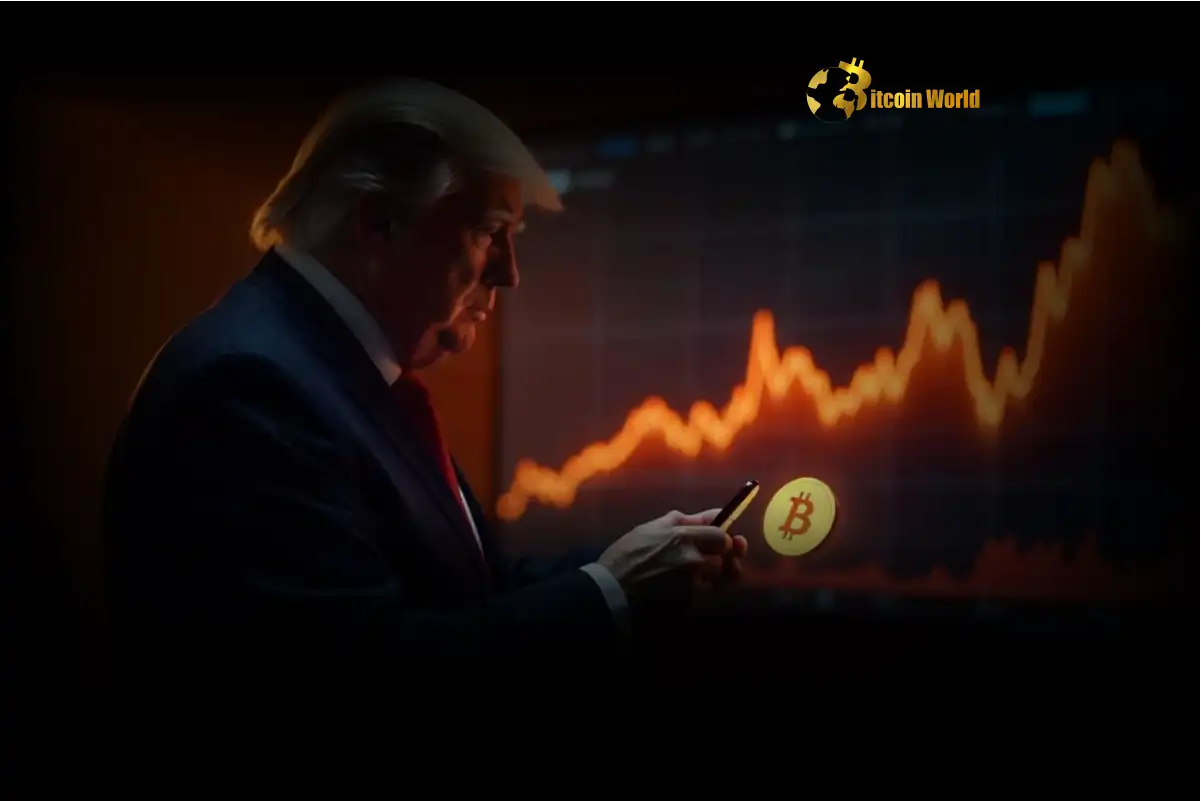BitcoinWorld

US Crypto Dominance: Trump’s Bold Vision for Global Leadership
The cryptocurrency world is buzzing with a significant development that could reshape the global digital asset landscape. According to a report by the Walter Bloomberg economic news account on X, former U.S. President Donald Trump has made a striking declaration: a forthcoming stablecoin regulation law, dubbed the ‘Genius Act,’ is set to secure ‘global dominance’ for the United States in the burgeoning crypto sector. With Trump expected to sign off on this legislation shortly, the implications for US Crypto Dominance are profound and warrant a closer look.
Understanding Trump’s Vision for US Crypto Dominance
Donald Trump’s recent comments underscore a strategic shift in the U.S. approach to digital assets. For years, the debate around cryptocurrency regulation in the United States has been marked by a patchwork of state and federal initiatives, often leading to uncertainty and hindering innovation. Trump’s assertion about achieving ‘global dominance’ through the ‘Genius Act’ signals a proactive, rather than reactive, stance. This isn’t just about managing risks; it’s about leveraging the potential of digital currencies to bolster America’s economic and technological leadership on the world stage.
The concept of US Crypto Dominance isn’t merely aspirational; it’s rooted in the recognition that digital assets, particularly stablecoins, are becoming increasingly integral to global finance. A clear, comprehensive regulatory framework could provide the necessary clarity for businesses to innovate, investors to participate securely, and for the U.S. dollar to maintain its primacy in a digitized world. This vision aims to prevent other nations from outpacing the U.S. in this critical technological frontier.
The Genius Act: A Deep Dive into Stablecoin Regulation
At the heart of Trump’s declaration is the ‘Genius Act,’ specifically identified as a stablecoin regulation law. Stablecoins, digital currencies designed to maintain a stable value relative to a fiat currency (like the U.S. dollar) or a basket of assets, are a cornerstone of the crypto economy. They facilitate trading, payments, and remittances, acting as a bridge between traditional finance and the decentralized world.
The need for robust stablecoin regulation has been a persistent topic of discussion among policymakers, regulators, and industry stakeholders. Key areas typically addressed in such legislation include:
- Issuance Requirements: Ensuring that stablecoin issuers maintain sufficient reserves, are transparent about their holdings, and undergo regular audits. This builds trust and mitigates risks of collapse, as seen with some past algorithmic stablecoin failures.
- Consumer Protection: Establishing safeguards for users, including clear disclosure requirements, dispute resolution mechanisms, and protection against fraud.
- Anti-Money Laundering (AML) and Counter-Terrorist Financing (CTF): Implementing stringent measures to prevent illicit activities, aligning stablecoins with existing financial regulations.
- Interoperability and Innovation: Balancing regulatory oversight with the need to foster innovation and allow stablecoins to seamlessly integrate into various financial systems.
If the ‘Genius Act’ effectively addresses these points, it could set a global precedent, attracting legitimate businesses and capital to the U.S. while deterring bad actors. This move is crucial for solidifying the U.S.’s position as a leader in digital finance.
Why is Crypto Legislation Crucial Now?
The push for comprehensive Crypto Legislation, especially concerning stablecoins, comes at a pivotal time for the global economy. The digital asset market has matured significantly, moving beyond niche speculation to widespread adoption in various sectors. However, this growth has also exposed regulatory gaps and risks.
The absence of clear federal guidelines has led to regulatory uncertainty, often forcing crypto businesses to navigate a complex and fragmented legal landscape. This uncertainty can stifle innovation, push companies offshore, and leave consumers vulnerable. Proactive Crypto Legislation offers several compelling benefits:
- Investor Confidence: A well-defined regulatory framework provides clarity and security for investors, encouraging broader participation in the digital asset market.
- Financial Stability: By regulating stablecoins, potential systemic risks to the broader financial system can be mitigated, especially as their market capitalization grows.
- Innovation Hub: Clear rules can attract leading blockchain companies and talent to the U.S., fostering an environment where innovation can thrive responsibly.
- Global Competitiveness: Other nations are actively developing their own crypto frameworks. Robust U.S. legislation ensures the country remains competitive and influential in shaping global standards.
The ‘Genius Act’ could be the cornerstone of a comprehensive U.S. strategy, moving beyond reactive enforcement actions to a proactive framework that embraces the future of finance.
The Path to Global Crypto Leadership: Challenges and Opportunities
Achieving ‘global dominance’ in crypto, as envisioned by Trump Crypto policy, is not without its challenges. While the ‘Genius Act’ represents a significant step, its success will depend on its implementation and the broader ecosystem’s response. Opportunities abound, but so do potential pitfalls.
Opportunities:
- Economic Growth: A thriving regulated crypto industry can create jobs, attract investment, and generate significant tax revenue.
- Technological Advancement: By fostering a conducive environment, the U.S. can become the epicenter for blockchain development, driving innovation in areas like DeFi, NFTs, and Web3.
- Reinforcing Dollar Primacy: Regulated, U.S. dollar-pegged stablecoins can extend the global reach and utility of the dollar in the digital age, solidifying its role as the world’s reserve currency.
Challenges:
- Balancing Innovation and Oversight: Overly restrictive regulations could stifle the very innovation they aim to protect. Striking the right balance is crucial.
- International Coordination: Crypto is borderless. Effective U.S. leadership will require collaboration with international bodies and other nations to establish harmonized global standards.
- Political Divides: The bipartisan nature of such legislation is key. While some consensus on stablecoins exists, broader crypto regulation remains a contentious issue in U.S. politics.
The ‘Genius Act’ could be a testament to a growing bipartisan recognition of crypto’s importance, signaling a unified front towards securing America’s digital future under Trump Crypto influence.
What Does This Mean for Trump Crypto Policy?
Donald Trump’s evolving stance on cryptocurrency has been a subject of keen observation. Initially critical, his recent embrace of digital assets, including statements about supporting crypto and now the ‘Genius Act,’ marks a notable pivot. This shift aligns with a broader trend among political figures recognizing the growing influence and economic potential of the crypto sector.
The emphasis on the ‘Genius Act’ and its aim for ‘global dominance’ suggests that Trump Crypto policy, if he returns to office, would likely prioritize a robust, clear, and perhaps even aggressive regulatory framework designed to ensure the U.S. leads, rather than lags, in the digital economy. This could mean:
- Faster Regulatory Action: A push to expedite the legislative process for digital assets.
- Focus on Dollar-Pegged Stablecoins: A strong emphasis on stablecoins backed by the U.S. dollar, leveraging them as a tool for American financial power.
- Innovation with Guardrails: Encouraging technological advancement within a defined regulatory perimeter, aiming to attract and retain crypto businesses in the U.S.
This proactive approach, exemplified by the ‘Genius Act,’ could define the next chapter of U.S. crypto policy, regardless of who occupies the White House, provided the legislative momentum continues.
The potential signing of the ‘Genius Act’ by Donald Trump marks a watershed moment for the U.S. in the global crypto race. By aiming to establish clear, comprehensive stablecoin regulation, the legislation seeks to secure America’s place as the undisputed leader in the digital asset space. This strategic move, part of a broader vision for US Crypto Dominance, could unlock unprecedented opportunities for economic growth, technological innovation, and financial stability. While challenges remain, the clear intent to foster a robust and regulated crypto environment underpins a future where the U.S. is not just a participant but a pioneer in the evolving digital economy. The ‘Genius Act’ is more than just a piece of legislation; it’s a statement of intent for America’s digital future.
Frequently Asked Questions (FAQs)
What is the ‘Genius Act’ mentioned by Donald Trump?
The ‘Genius Act’ is described by Donald Trump as a stablecoin regulation law aimed at ensuring the United States achieves ‘global dominance’ in the cryptocurrency sector. While specific details of the bill are not yet widely public, it is expected to establish a comprehensive framework for how stablecoins are issued, backed, and regulated within the U.S.
Why is stablecoin regulation important for US Crypto Dominance?
Stablecoin regulation is crucial for US Crypto Dominance because it provides clarity and stability to a rapidly growing segment of the digital asset market. By setting clear rules for stablecoin issuance and reserves, it builds investor confidence, mitigates financial risks, and encourages legitimate businesses to operate within the U.S., ultimately strengthening the country’s position in global digital finance.
How might this new Crypto Legislation impact the broader crypto market?
This new Crypto Legislation, if enacted, could bring significant positive impacts to the broader crypto market. It could lead to increased institutional adoption, greater consumer protection, and a more predictable operating environment for crypto businesses. This clarity might also encourage more traditional financial institutions to engage with digital assets, further integrating crypto into the mainstream economy.
Has Donald Trump always supported crypto?
Donald Trump’s stance on crypto has evolved. Historically, he expressed skepticism about cryptocurrencies. However, his recent statements, including the one about the ‘Genius Act’ and aiming for Trump Crypto dominance, indicate a notable shift towards a more supportive and strategic view of digital assets, recognizing their growing importance.
What are the potential challenges in achieving ‘global dominance’ in crypto?
Achieving ‘global dominance’ in crypto faces several challenges, including the need to balance innovation with robust oversight, coordinating with international regulatory bodies due to crypto’s borderless nature, and navigating potential political divides within the U.S. to ensure consistent and effective policy implementation. However, the ‘Genius Act’ represents a significant step towards overcoming these hurdles.
If you found this article insightful, please consider sharing it with your network on social media. Your support helps us continue delivering vital insights into the evolving world of cryptocurrency and blockchain technology!
To learn more about the latest crypto market trends, explore our article on key developments shaping stablecoin regulation and institutional adoption.
This post US Crypto Dominance: Trump’s Bold Vision for Global Leadership first appeared on BitcoinWorld and is written by Editorial Team





